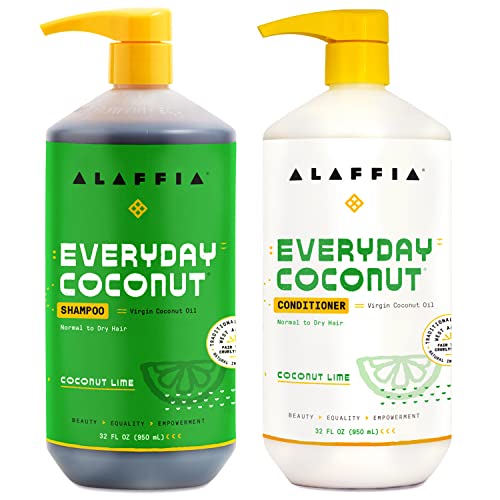
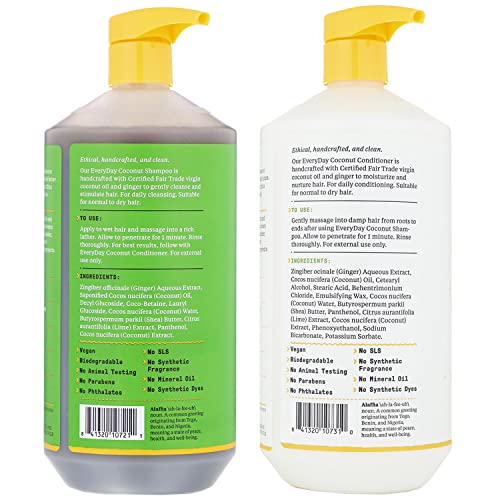
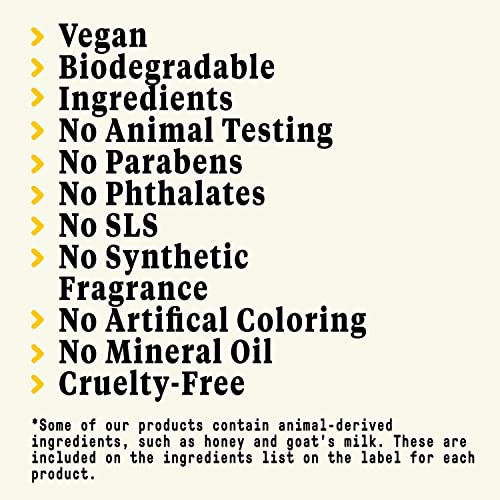
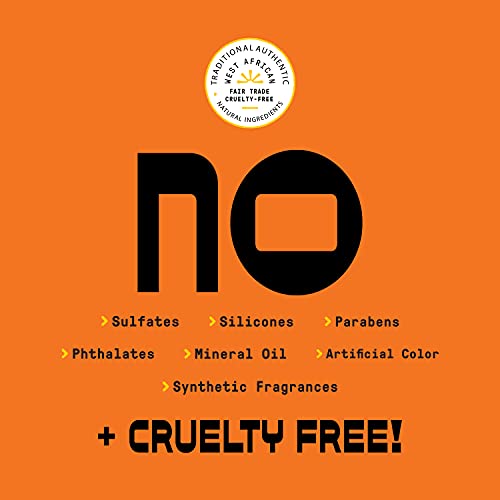

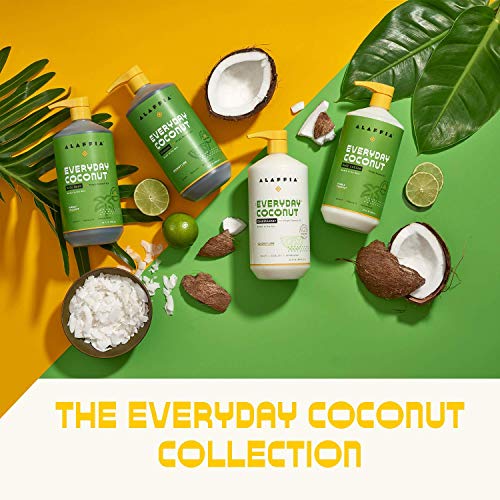
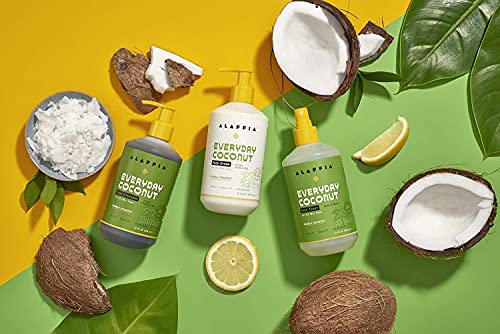
Alaffia EveryDay Coconut Shampoo & Conditioner Set - Hydrates with Fair-Trade Ingredients - 32 Fl Oz


Behentrimonium Chloride
High RiskBehentrimonium chloride is a quaternary ammonium compound primarily used as a conditioning agent in hair and skin care products. It functions as an emulsifier and surfactant, helping to improve texture and manageability of hair.
Sustai Insights
Behentrimonium chloride offers functional benefits as a hair conditioner and emulsifier. However, it is associated with moderate allergenic potential and has high use restrictions due to regulatory concerns. It poses low risks for carcinogenicity and developmental toxicity but has been noted for neurotoxicity. Environmental risks include potential pollution and low biodegradability. Overall, the ingredient is assessed as high risk, and users should consider alternatives such as natural conditioners.
Cocamidopropyl Betaine
High RiskCocamidopropyl betaine is a synthetic surfactant derived from coconut oil, commonly used in personal care products for its mild cleansing and foaming properties. It functions as a surfactant, emulsifier, and thickening agent, contributing to the texture and performance of formulations.
Sustai Insights
Cocamidopropyl betaine offers functional benefits as a gentle surfactant, enhancing product foaming and texture. However, it may pose low to moderate allergenic risks and is subject to high use restrictions due to contamination concerns. Regulatory bodies have advised on its safe levels of usage, categorizing its risk level as high overall. Users should practice caution, particularly with sensitive populations, and consider alternatives like naturally derived surfactants for safer formulations.
Potassium Sorbate
Medium RiskPotassium sorbate is a potassium salt of sorbic acid, primarily used as a preservative in food and cosmetic products. It inhibits the growth of molds, yeast, and some bacteria, extending the shelf life of products. It is commonly found in various formulations due to its effectiveness and low toxicity.
Sustai Insights
Potassium sorbate serves as an effective preservative, preventing microbial growth in food and cosmetic products, which is vital for safety and longevity. Although it has a low risk of carcinogenicity and developmental toxicity, there is a moderate concern regarding allergies and immunotoxicity. Environmentally, it poses minimal risks as it is not significantly bioaccumulative. Regulatory agencies have verified its use, although some products may face restrictions. Overall, it is assessed as a medium risk ingredient, with safe usage practices recommended, and alternatives such as natural preservatives could be considered.
Emulsifying Wax
Medium RiskEmulsifying wax is a mixture derived from plant and synthetic sources, primarily used to stabilize emulsions in cosmetic and personal care products. Its primary function is to blend oil and water-based ingredients, ensuring a uniform consistency and enhancing product texture.
Sustai Insights
Emulsifying wax offers functional benefits as an effective emulsifier, helping to create stable formulations in cosmetic products. It generally poses low health risks, with minimal concerns regarding carcinogenicity and allergenic potential. Environmental risks are also low, with no significant pollutant or bioaccumulation issues. However, use restrictions exist, and irritation potential is noted for sensitive skin. Regulatory assessments indicate it is safe for use within established concentration limits, leading to an overall moderate risk assessment. Alternatives like plant-based emulsifiers may offer sustainable options.
Phenoxyethanol
Medium RiskPhenoxyethanol is a preservative used in cosmetics and personal care products to prevent microbial growth and extend shelf life. It is commonly found in formulations such as lotions, creams, and serums.
Sustai Insights
Phenoxyethanol serves effectively as a preservative, ensuring product stability and safety by inhibiting microbial growth. It is considered to have low health risks regarding carcinogenicity, allergies, and reproductive toxicity. However, moderate use restrictions exist, and regulatory bodies have advised caution in specific applications. Environmental concerns include its potential as a pollutant, although it is not highly bioaccumulative. Overall, the ingredient presents a medium risk level, with safe usage practices recommended and alternative preservatives available for those seeking greener options.
Panthenol, D
Low RiskPanthenol, also known as provitamin B5, is a humectant commonly used in cosmetic and personal care products. It functions primarily as a moisturizer, enhancing skin hydration and improving the appearance of hair by imparting shine and softness.
Sustai Insights
Panthenol is effective in retaining moisture, thus providing functional benefits for skin and hair care products. It is generally recognized as safe, with low concerns regarding carcinogenicity, allergies, and developmental toxicity. However, potential cumulative exposure from multiple sources exists. Environmental risks are minimal, and it is not bioaccumulative. Regulatory bodies have not issued significant warnings; therefore, the overall risk level is assessed as low. For optimal use, it is recommended to follow product guidelines, and alternatives such as glycerin may also be considered for moisturizing effects.
Cocos Nucifera (Coconut) Oil
Low RiskCocos Nucifera (Coconut) Oil is derived from the kernels of the coconut palm. It is primarily used in cosmetic formulations for its emollient and moisturizing properties, making it suitable for skin and hair care products.
Sustai Insights
Coconut oil serves as an effective moisturizer and emollient, promoting skin hydration and softness. It is sustainably sourced and biodegradable. Health risks are minimal, with low concerns regarding carcinogenicity, allergens, and reproductive toxicity. Environmental impact is also low, as it does not contribute significantly to pollution or bioaccumulation. Regulatory bodies have not issued restrictions on its use. Overall, coconut oil presents a low risk for health and environmental concerns, making it a safe ingredient in cosmetic products.
Cocos Nucifera (Coconut) Water
Low RiskCocos Nucifera (coconut) water is an aqueous extract derived from the fruit of the coconut palm. It is commonly used in cosmetic and personal care products for its hydrating and soothing properties. Coconut water is rich in electrolytes and nutrients, making it a popular ingredient in formulations aimed at hydration.
Sustai Insights
Coconut water provides effective hydration and possesses antioxidant properties, contributing to skin health. It is sustainably sourced and biodegradable, enhancing its environmental profile. Health risks are minimal, with low concerns for carcinogenicity, allergies, or reproductive toxicity. Regulatory bodies do not impose significant restrictions on its use, marking it as a low-risk ingredient. Safe usage practices recommend using it in formulations designed for topical application, with alternatives including aloe vera for similar hydration benefits.
Caprylyl/ Capryl Glycoside
Low RiskCaprylyl/Capryl Glycoside is a surfactant derived from natural sources, primarily used in personal care and cosmetic products for its emulsifying properties. It helps to stabilize formulations and enhance cleaning efficacy while being gentle on the skin.
Sustai Insights
Caprylyl/Capryl Glycoside offers functional benefits as a mild surfactant and emulsifier, contributing to product stability without significant irritation. It is biodegradable and considered sustainably sourced. Health risks are low, with minimal concerns regarding carcinogenicity and developmental toxicity. Environmental impact is also low, as it does not accumulate in ecosystems. Regulatory assessments indicate no current restrictions. Overall, it presents a low risk profile, making it a suitable choice in formulations.
Decyl Glucoside
Low RiskDecyl glucoside is a glucose-based surfactant derived from natural sources, primarily used as a mild cleansing agent in personal care products. It effectively reduces surface tension, allowing for improved mixing of ingredients and enhanced cleansing properties without stripping natural oils from the skin.
Sustai Insights
Decyl glucoside offers functional benefits as a non-ionic surfactant, making it suitable for sensitive skin formulations. It is biodegradable and derived from renewable resources, supporting sustainability. Health risks are primarily low, with minimal concerns regarding irritation and allergies. Environmental risks are low, as it does not significantly contribute to pollution or bioaccumulation. Regulatory status is generally favorable, with low restrictions noted. Overall, decyl glucoside presents a low risk for use in consumer products, making it a suitable choice for gentle formulations.
Hydrogenated Coconut Oil
Low RiskHydrogenated coconut oil is an end product of the hydrogenation process, where coconut oil is chemically altered to enhance its stability and shelf-life. It serves primarily as an emollient and thickening agent in cosmetic formulations, providing a smooth texture and moisturizing properties.
Sustai Insights
Hydrogenated coconut oil offers functional benefits as a moisturizing agent and stabilizer in formulations. It is generally recognized as safe with low risks for cancer, allergies, and reproductive toxicity, according to the Cosmetic Ingredient Review (CIR). Environmental impacts are minimal, with no significant pollutant potential. Regulatory bodies have not issued advisories against its use. Overall, the ingredient presents a low risk profile, making it a suitable choice in cosmetic products. For those seeking alternatives, natural oils or non-hydrogenated variants may be considered.
Sodium Bicarbonate
Low RiskSodium bicarbonate, commonly known as baking soda, is an inorganic compound with the formula NaHCO₃. It functions primarily as a leavening agent in baking, helping to produce carbon dioxide gas when it reacts with acids, thereby causing dough to rise. It also serves as a mild alkaline agent in various personal care products.
Sustai Insights
Sodium bicarbonate is valued for its effectiveness as a leavening agent and its role in neutralizing acidity, contributing to product stability. It is considered environmentally friendly and biodegradable. Health risks are minimal, with low concerns regarding carcinogenicity, allergies, and reproductive toxicity. It is not classified as a pollutant and poses no significant environmental hazards. Regulatory assessments indicate it is safe for use in food and cosmetic products. Overall, sodium bicarbonate carries a low risk, making it a practical choice in many applications.
Butyrospermum Parkii (Shea) Butter
Low RiskButyrospermum parkii (shea) butter is a vegetable fat derived from the nuts of the shea tree. It is commonly used in cosmetic formulations for its emollient properties, providing moisture and improving skin texture. Additionally, shea butter is known for its ability to enhance the stability of products and deliver a creamy texture.
Sustai Insights
Shea butter offers functional benefits as an effective moisturizer, enhancing skin barrier function and texture. It is sustainably sourced and biodegradable, contributing to eco-friendliness. Health-wise, it is associated with low risks for carcinogenicity, allergies, and reproductive toxicity. Environmental impacts are minimal, with no significant pollutant potential identified. Regulatory assessments indicate no current restrictions. Overall, the ingredient presents a low risk, making it a favorable choice in cosmetic formulations.
Citrus Aurantifolia (Lime) Fruit Extract
Low RiskCitrus aurantifolia (lime) fruit extract is derived from the fruit of the lime tree. It is commonly used in cosmetic formulations for its aromatic properties and potential skin benefits, often included for fragrance or as a natural preservative due to its antioxidant content.
Sustai Insights
Citrus aurantifolia (lime) fruit extract offers functional benefits, including antioxidant properties and a refreshing scent, contributing to product appeal. It has a low risk profile concerning health impacts, with minimal concerns for carcinogenicity, allergies, or reproductive toxicity. Environmental risks are also low, as it is not known to be a pollutant or bioaccumulative. Regulatory status indicates that it is allowed in cosmetics with no specific restrictions. Overall, safe usage practices should be followed, and while alternatives exist, they may not replicate all benefits. Thus, the overall risk assessment is low.
Stearic Acid
Low RiskStearic acid is a naturally occurring fatty acid commonly found in animal and vegetable fats. It functions primarily as an emulsifier, thickener, and stabilizer in cosmetic and personal care products, providing texture and consistency.
Sustai Insights
Stearic acid offers functional benefits such as effective emulsification and stabilization of formulations. It is derived from renewable sources and is biodegradable, contributing to its sustainability profile. Health risks are low, with minimal concerns regarding carcinogenicity, allergies, or reproductive toxicity. Environmental risks are also low, with no significant pollutants or bioaccumulation concerns noted. Regulatory bodies, including the FDA, do not impose restrictions on its use. Overall, stearic acid is assessed as low risk, and its safe usage practices are well-established, with no significant alternatives needed.
Cetearyl Alcohol
Low RiskCetearyl alcohol is a mixture of cetyl and stearyl alcohol, primarily used as an emulsifier and thickener in cosmetic formulations. It helps stabilize products, improve texture, and enhance moisturizing properties, making it common in creams and lotions.
Sustai Insights
Cetearyl alcohol offers functional benefits as an effective emulsifier and skin-conditioning agent, contributing to product stability and texture. It is generally recognized as safe, with low concerns for carcinogenicity, allergies, or reproductive toxicity. Environmental risks are minimal, as it is biodegradable and has low pollutant potential. Regulatory bodies have not imposed significant restrictions on its use. Overall, cetearyl alcohol is assessed to carry low risk, making it a suitable ingredient choice in cosmetic products.
Panthenol, D
Low RiskPanthenol, also known as provitamin B5, is a humectant commonly used in cosmetic and personal care products. It functions primarily as a moisturizer, enhancing skin hydration and improving the appearance of hair by imparting shine and softness.
Sustai Insights
Panthenol is effective in retaining moisture, thus providing functional benefits for skin and hair care products. It is generally recognized as safe, with low concerns regarding carcinogenicity, allergies, and developmental toxicity. However, potential cumulative exposure from multiple sources exists. Environmental risks are minimal, and it is not bioaccumulative. Regulatory bodies have not issued significant warnings; therefore, the overall risk level is assessed as low. For optimal use, it is recommended to follow product guidelines, and alternatives such as glycerin may also be considered for moisturizing effects.
Cocos Nucifera (Coconut) Oil
Low RiskCocos Nucifera (Coconut) Oil is derived from the kernels of the coconut palm. It is primarily used in cosmetic formulations for its emollient and moisturizing properties, making it suitable for skin and hair care products.
Sustai Insights
Coconut oil serves as an effective moisturizer and emollient, promoting skin hydration and softness. It is sustainably sourced and biodegradable. Health risks are minimal, with low concerns regarding carcinogenicity, allergens, and reproductive toxicity. Environmental impact is also low, as it does not contribute significantly to pollution or bioaccumulation. Regulatory bodies have not issued restrictions on its use. Overall, coconut oil presents a low risk for health and environmental concerns, making it a safe ingredient in cosmetic products.
Cocos Nucifera (Coconut) Water
Low RiskCocos Nucifera (coconut) water is an aqueous extract derived from the fruit of the coconut palm. It is commonly used in cosmetic and personal care products for its hydrating and soothing properties. Coconut water is rich in electrolytes and nutrients, making it a popular ingredient in formulations aimed at hydration.
Sustai Insights
Coconut water provides effective hydration and possesses antioxidant properties, contributing to skin health. It is sustainably sourced and biodegradable, enhancing its environmental profile. Health risks are minimal, with low concerns for carcinogenicity, allergies, or reproductive toxicity. Regulatory bodies do not impose significant restrictions on its use, marking it as a low-risk ingredient. Safe usage practices recommend using it in formulations designed for topical application, with alternatives including aloe vera for similar hydration benefits.
Potassium Sorbate
Medium RiskPotassium sorbate is a potassium salt of sorbic acid, primarily used as a preservative in food and cosmetic products. It inhibits the growth of molds, yeast, and some bacteria, extending the shelf life of products. It is commonly found in various formulations due to its effectiveness and low toxicity.
Sustai Insights
Potassium sorbate serves as an effective preservative, preventing microbial growth in food and cosmetic products, which is vital for safety and longevity. Although it has a low risk of carcinogenicity and developmental toxicity, there is a moderate concern regarding allergies and immunotoxicity. Environmentally, it poses minimal risks as it is not significantly bioaccumulative. Regulatory agencies have verified its use, although some products may face restrictions. Overall, it is assessed as a medium risk ingredient, with safe usage practices recommended, and alternatives such as natural preservatives could be considered.
Emulsifying Wax
Medium RiskEmulsifying wax is a mixture derived from plant and synthetic sources, primarily used to stabilize emulsions in cosmetic and personal care products. Its primary function is to blend oil and water-based ingredients, ensuring a uniform consistency and enhancing product texture.
Sustai Insights
Emulsifying wax offers functional benefits as an effective emulsifier, helping to create stable formulations in cosmetic products. It generally poses low health risks, with minimal concerns regarding carcinogenicity and allergenic potential. Environmental risks are also low, with no significant pollutant or bioaccumulation issues. However, use restrictions exist, and irritation potential is noted for sensitive skin. Regulatory assessments indicate it is safe for use within established concentration limits, leading to an overall moderate risk assessment. Alternatives like plant-based emulsifiers may offer sustainable options.
Caprylyl/ Capryl Glycoside
Low RiskCaprylyl/Capryl Glycoside is a surfactant derived from natural sources, primarily used in personal care and cosmetic products for its emulsifying properties. It helps to stabilize formulations and enhance cleaning efficacy while being gentle on the skin.
Sustai Insights
Caprylyl/Capryl Glycoside offers functional benefits as a mild surfactant and emulsifier, contributing to product stability without significant irritation. It is biodegradable and considered sustainably sourced. Health risks are low, with minimal concerns regarding carcinogenicity and developmental toxicity. Environmental impact is also low, as it does not accumulate in ecosystems. Regulatory assessments indicate no current restrictions. Overall, it presents a low risk profile, making it a suitable choice in formulations.
Decyl Glucoside
Low RiskDecyl glucoside is a glucose-based surfactant derived from natural sources, primarily used as a mild cleansing agent in personal care products. It effectively reduces surface tension, allowing for improved mixing of ingredients and enhanced cleansing properties without stripping natural oils from the skin.
Sustai Insights
Decyl glucoside offers functional benefits as a non-ionic surfactant, making it suitable for sensitive skin formulations. It is biodegradable and derived from renewable resources, supporting sustainability. Health risks are primarily low, with minimal concerns regarding irritation and allergies. Environmental risks are low, as it does not significantly contribute to pollution or bioaccumulation. Regulatory status is generally favorable, with low restrictions noted. Overall, decyl glucoside presents a low risk for use in consumer products, making it a suitable choice for gentle formulations.
Behentrimonium Chloride
High RiskBehentrimonium chloride is a quaternary ammonium compound primarily used as a conditioning agent in hair and skin care products. It functions as an emulsifier and surfactant, helping to improve texture and manageability of hair.
Sustai Insights
Behentrimonium chloride offers functional benefits as a hair conditioner and emulsifier. However, it is associated with moderate allergenic potential and has high use restrictions due to regulatory concerns. It poses low risks for carcinogenicity and developmental toxicity but has been noted for neurotoxicity. Environmental risks include potential pollution and low biodegradability. Overall, the ingredient is assessed as high risk, and users should consider alternatives such as natural conditioners.
Hydrogenated Coconut Oil
Low RiskHydrogenated coconut oil is an end product of the hydrogenation process, where coconut oil is chemically altered to enhance its stability and shelf-life. It serves primarily as an emollient and thickening agent in cosmetic formulations, providing a smooth texture and moisturizing properties.
Sustai Insights
Hydrogenated coconut oil offers functional benefits as a moisturizing agent and stabilizer in formulations. It is generally recognized as safe with low risks for cancer, allergies, and reproductive toxicity, according to the Cosmetic Ingredient Review (CIR). Environmental impacts are minimal, with no significant pollutant potential. Regulatory bodies have not issued advisories against its use. Overall, the ingredient presents a low risk profile, making it a suitable choice in cosmetic products. For those seeking alternatives, natural oils or non-hydrogenated variants may be considered.
Sodium Bicarbonate
Low RiskSodium bicarbonate, commonly known as baking soda, is an inorganic compound with the formula NaHCO₃. It functions primarily as a leavening agent in baking, helping to produce carbon dioxide gas when it reacts with acids, thereby causing dough to rise. It also serves as a mild alkaline agent in various personal care products.
Sustai Insights
Sodium bicarbonate is valued for its effectiveness as a leavening agent and its role in neutralizing acidity, contributing to product stability. It is considered environmentally friendly and biodegradable. Health risks are minimal, with low concerns regarding carcinogenicity, allergies, and reproductive toxicity. It is not classified as a pollutant and poses no significant environmental hazards. Regulatory assessments indicate it is safe for use in food and cosmetic products. Overall, sodium bicarbonate carries a low risk, making it a practical choice in many applications.
Phenoxyethanol
Medium RiskPhenoxyethanol is a preservative used in cosmetics and personal care products to prevent microbial growth and extend shelf life. It is commonly found in formulations such as lotions, creams, and serums.
Sustai Insights
Phenoxyethanol serves effectively as a preservative, ensuring product stability and safety by inhibiting microbial growth. It is considered to have low health risks regarding carcinogenicity, allergies, and reproductive toxicity. However, moderate use restrictions exist, and regulatory bodies have advised caution in specific applications. Environmental concerns include its potential as a pollutant, although it is not highly bioaccumulative. Overall, the ingredient presents a medium risk level, with safe usage practices recommended and alternative preservatives available for those seeking greener options.
Butyrospermum Parkii (Shea) Butter
Low RiskButyrospermum parkii (shea) butter is a vegetable fat derived from the nuts of the shea tree. It is commonly used in cosmetic formulations for its emollient properties, providing moisture and improving skin texture. Additionally, shea butter is known for its ability to enhance the stability of products and deliver a creamy texture.
Sustai Insights
Shea butter offers functional benefits as an effective moisturizer, enhancing skin barrier function and texture. It is sustainably sourced and biodegradable, contributing to eco-friendliness. Health-wise, it is associated with low risks for carcinogenicity, allergies, and reproductive toxicity. Environmental impacts are minimal, with no significant pollutant potential identified. Regulatory assessments indicate no current restrictions. Overall, the ingredient presents a low risk, making it a favorable choice in cosmetic formulations.
Cocamidopropyl Betaine
High RiskCocamidopropyl betaine is a synthetic surfactant derived from coconut oil, commonly used in personal care products for its mild cleansing and foaming properties. It functions as a surfactant, emulsifier, and thickening agent, contributing to the texture and performance of formulations.
Sustai Insights
Cocamidopropyl betaine offers functional benefits as a gentle surfactant, enhancing product foaming and texture. However, it may pose low to moderate allergenic risks and is subject to high use restrictions due to contamination concerns. Regulatory bodies have advised on its safe levels of usage, categorizing its risk level as high overall. Users should practice caution, particularly with sensitive populations, and consider alternatives like naturally derived surfactants for safer formulations.
Citrus Aurantifolia (Lime) Fruit Extract
Low RiskCitrus aurantifolia (lime) fruit extract is derived from the fruit of the lime tree. It is commonly used in cosmetic formulations for its aromatic properties and potential skin benefits, often included for fragrance or as a natural preservative due to its antioxidant content.
Sustai Insights
Citrus aurantifolia (lime) fruit extract offers functional benefits, including antioxidant properties and a refreshing scent, contributing to product appeal. It has a low risk profile concerning health impacts, with minimal concerns for carcinogenicity, allergies, or reproductive toxicity. Environmental risks are also low, as it is not known to be a pollutant or bioaccumulative. Regulatory status indicates that it is allowed in cosmetics with no specific restrictions. Overall, safe usage practices should be followed, and while alternatives exist, they may not replicate all benefits. Thus, the overall risk assessment is low.
Stearic Acid
Low RiskStearic acid is a naturally occurring fatty acid commonly found in animal and vegetable fats. It functions primarily as an emulsifier, thickener, and stabilizer in cosmetic and personal care products, providing texture and consistency.
Sustai Insights
Stearic acid offers functional benefits such as effective emulsification and stabilization of formulations. It is derived from renewable sources and is biodegradable, contributing to its sustainability profile. Health risks are low, with minimal concerns regarding carcinogenicity, allergies, or reproductive toxicity. Environmental risks are also low, with no significant pollutants or bioaccumulation concerns noted. Regulatory bodies, including the FDA, do not impose restrictions on its use. Overall, stearic acid is assessed as low risk, and its safe usage practices are well-established, with no significant alternatives needed.
Cetearyl Alcohol
Low RiskCetearyl alcohol is a mixture of cetyl and stearyl alcohol, primarily used as an emulsifier and thickener in cosmetic formulations. It helps stabilize products, improve texture, and enhance moisturizing properties, making it common in creams and lotions.
Sustai Insights
Cetearyl alcohol offers functional benefits as an effective emulsifier and skin-conditioning agent, contributing to product stability and texture. It is generally recognized as safe, with low concerns for carcinogenicity, allergies, or reproductive toxicity. Environmental risks are minimal, as it is biodegradable and has low pollutant potential. Regulatory bodies have not imposed significant restrictions on its use. Overall, cetearyl alcohol is assessed to carry low risk, making it a suitable ingredient choice in cosmetic products.
Experience the nourishing benefits of Alaffia EveryDay Coconut Shampoo and Conditioner, expertly crafted for normal to dry hair. Infused with ethically sourced ingredients, this duo hydrates and revitalizes while supporting sustainable practices.
- Hydration & Moisture: Deeply hydrates hair with shea butter and virgin coconut oil, leaving it soft and manageable.
- Gentle Cleansing: Sulfate-free formula cleanses without stripping natural oils, ideal for sensitive scalps.
- Ethically Sourced Ingredients: Made with fair-trade coconut oil from women-led cooperatives in Togo, promoting social equity and environmental sustainability.
- Invigorating Scent: Enjoy the refreshing aroma of coconut and lime, turning your hair care routine into a tropical escape.
- Cruelty-Free Commitment: Alaffia is proudly cruelty-free, ensuring no animals are harmed in the creation of these products.
Support your hair’s health and the planet with this luxurious shampoo and conditioner set, designed for the environmentally and health-conscious consumer.
Subscribe & Save with Sustai
- Best Price Guarantee: Always enjoy the lowest prices on sustainable home essentials.
- No Surprises: We’ll notify you before shipping. No hidden fees, ever.
- You’re in Charge: Change, pause, or cancel your subscription anytime with ease.
- Eco-Friendly Deliveries: Our grouped shipments mean less packaging and lower emissions.
Join us on a sustainable journey. Special offers for a limited time! Prices and promotions may change.
Recommended Products
Experience the nourishing benefits of Alaffia EveryDay Coconut Shampoo and Conditioner, expertly crafted for normal to dry hair. Infused with ethically sourced ingredients, this duo hydrates and revitalizes while supporting sustainable practices.
- Hydration & Moisture: Deeply hydrates hair with shea butter and virgin coconut oil, leaving it soft and manageable.
- Gentle Cleansing: Sulfate-free formula cleanses without stripping natural oils, ideal for sensitive scalps.
- Ethically Sourced Ingredients: Made with fair-trade coconut oil from women-led cooperatives in Togo, promoting social equity and environmental sustainability.
- Invigorating Scent: Enjoy the refreshing aroma of coconut and lime, turning your hair care routine into a tropical escape.
- Cruelty-Free Commitment: Alaffia is proudly cruelty-free, ensuring no animals are harmed in the creation of these products.
Support your hair’s health and the planet with this luxurious shampoo and conditioner set, designed for the environmentally and health-conscious consumer.

You can have at most 2 Sustainable Steals products in your cart
Customer Reviews
Customers’ View
Customers express a generally positive sentiment towards the Shampoo and Conditioner Set, particularly appreciating its hydrating properties. Many users note that it effectively softens hair, with one reviewer stating it makes their hair feel soft, while others highlight the nourishing ingredients like ethically sourced coconut oil and ginger. However, there are mixed feelings about the product's scent; some customers enjoy the tropical aroma, while others find it overpowering or unpleasant. Health-conscious consumers value the sulfate-free formula and the commitment to cruelty-free practices, aligning with eco-friendly values. Overall, while the product has received both praise and criticism, it is recognized for its moisturizing benefits and ethical sourcing.
AI-generated from the text of customer reviewsThis product has no reviews yet.




